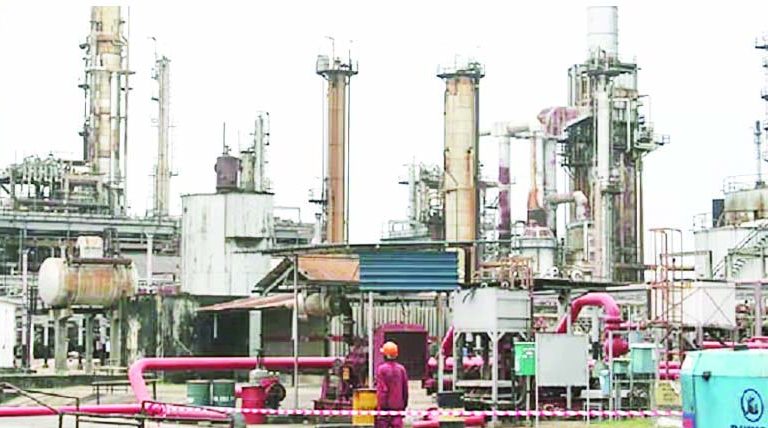Inside plot to grab 370-acre refinery land

President William Ruto’s administration has begun a rapid process to transfer Kenya Petroleum Refineries Ltd (KPRL) to a foreign investor, with the parastatal’s prime land serving as the primary draw.
The defunct facility sits on 370 acres of strategically located land near the coast. KPRL’s assets, including this sprawling property, have remained idle for nine years since operations ceased.
The proposed acquisition of the Mombasa-based refinery – a subsidiary of Kenya Pipeline Company (KPC) – has sparked concerns about the fate of its valuable land holdings.
Mounting pressure
High-ranking sources at the National Land Commission told People Daily they face mounting pressure to expedite concession documents for transferring the facility to a foreign investor suspected of fronting for powerful government figures known for their land acquisition activities.
“We were told that [our job security] depended on how fast we can expedite the transaction. There was too much pressure from high places channelled through Kenya Pipeline, which was using the refinery as a storage facility,” said a source who requested anonymity for fear of retaliation.
“Just look at the speed at which the process is being carried out. This is meant to conceal the real intention of the government which is to grab the vast land.”
The transfer process began with Cabinet approval on July 18, 2023, authorising the transfer of KPRL shares to KPC. Correspondence between Energy Cabinet Secretary Opiyo Wandayi and National Treasury CS John Mbadi shows Treasury approved the dissolution process on March 11, 2025.
The sequence unfolded as follows: On May 21, 2024, KPC’s managing director formally requested the Treasury and Energy ministries’ approval to dissolve KPRL. In his March 11 letter, CS Mbadi confirmed that a share transfer agreement executed on October 27, 2023 had made KPRL a KPC subsidiary.
“In a joint meeting held on April 25, 2024 between KPC and KPRL Board members, a resolution was passed allowing KPC to initiate the process of merging and dissolving KPRL. This was affirmed in a follow-up board meeting on May 21, 2024,” Mbadi stated.
Red Flags
The move has triggered fierce debate, particularly regarding KPRL’s extensive Mombasa land holdings. Critics allege a calculated scheme by well-connected individuals to control prime real estate, following the Energy ministry’s contentious decision to block KPC’s liquefied petroleum gas (LPG) facility plans and award the project to a private company instead.
Asharami Synergy, a subsidiary of Nigeria’s Sahara Group, will lease 23.19 acres of KPRL land in Changamwe, Mombasa, to develop a 30,000-metric-tonne LPG facility under a 31-year public-private partnership agreement.
The private firm reportedly submitted a proposal for the same project KPC had been developing for months. KPC, which completed its KPRL acquisition in 2023, had already invested Sh192.64 million in preparatory work, including demand surveys, environmental impact assessments, and engineering designs.
KPC viewed the common-user LPG facility as transformative – potentially slashing cooking gas prices while boosting environmental sustainability.
However, in an abrupt policy reversal, the Energy Treasury ministries ordered KPC to abandon the project in favour of Asharami.
The Office of the Auditor General has questioned this decision, citing wasted public funds and asking whether KPC will receive compensation for its abandoned plans.
KPRL defended the lease arrangement last month, insisting it followed proper procedures in competitively selecting a private sector partner.
“The government resolved to establish bulk LPG storage and handling infrastructure through private sector-led initiatives,” the company said in a statement. “KPRL gives notice of the intention to lease … parcels of land to the successful tenderer.”
Eviction Plans
Asharami is among the companies handling fuel imports under Kenya’s government-to-government oil deal, alongside Gulf Energy, One Petroleum, and Galana Oil.
Simultaneously, the government is moving to evict illegal settlers from KPRL land in Port Reitz, Mombasa. During his first tour of energy facilities in Mombasa, Wandayi warned that the encroachment creates serious safety hazards.
“The settlements are dangerously close to key petroleum infrastructure, including pipelines linking to Nairobi. Any accident here could be catastrophic,” he said.
The CS announced plans to begin evictions with the “big fish” – landlords who have constructed rental properties on the land. While promising collaboration with local leaders and Mombasa county for humane solutions, he insisted the strategic facility must be secured.
“This is a [ticking] time bomb. We cannot allow our national asset and surrounding communities to be at such risk,” he stressed.
Refinery operations
The courts addressed this issue in 2013 when Justice Maureen Odero declared the squatters’ occupation illegal and ordered them to vacate, citing dangers from cultivating or building near flammable petroleum pipelines.
Wandayi clarified that while KPC is absorbing KPRL’s assets and operations, there are no plans to restart the defunct refinery, which shut down in 2014 due to financial losses. “The economics don’t support refining crude locally. It’s far cheaper to import refined products,” he noted.
Instead, the amalgamation will boost KPC’s capacity to handle larger volumes of fuel for regional markets like Uganda, DRC, South Sudan, and potentially Rwanda.
KPRL’s dissolution was a key recommendation from the National Assembly’s Public Investments Committee last year. The committee highlighted questionable payments made by KPC to the inactive refinery.











